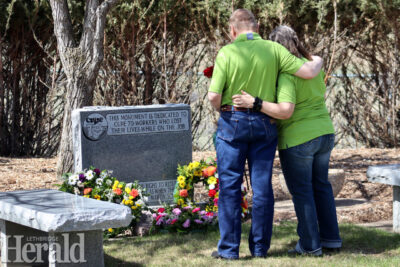Day of Mourning honours Albertans killed in workplace
By Lethbridge Herald on April 29, 2023.
 Herald photo by Al Beeber
Bruce and Wendy-Ellen Nittle, whose son Blaine died in a workplace accident, lay a rose at the CUPE 70 monument at Mountain View cemetery during a Day of Mourning ceremony Friday.
Herald photo by Al Beeber
Bruce and Wendy-Ellen Nittle, whose son Blaine died in a workplace accident, lay a rose at the CUPE 70 monument at Mountain View cemetery during a Day of Mourning ceremony Friday.Al Beeber – LETHBRIDGE HERALD – abeeber@lethbridgeherald.com
Every year, workers are injured, disabled or die on the job in Canada and on Friday, they were honoured in a wreath-laying ceremony at the CUPE 70 Workers Memorial Site in Mountain View Cemetery.
Speakers included Lethbridge Police Service chief Shahin Mehdizadeh, NDP MLA for Lethbridge West Shannon Phillips, Susan Gouw of CUPE 70, city councillor Jenn Schmidt-Rempel and Wendy-Ellen Nittle from the Threads of Life organization.
The event began with the LPS Honour Guard marching to the memorial site.
Emcee Ryan Mennie of Lethbridge College said each year on April 28, the Day of Mourning is recognized to pay respects to “and honour those who have been killed, injured or suffered illness as a result of work-related incidents.
“This day is now recognized internationally but it began here in Canada when unions in Sudbury, Ontario first observed a day of mourning in 1984. The Canadian Labour Congress held its first day of remembrance in 1986. April 28 was chosen to reflect the anniversary of the day Ontario passed the Workers Compensation Act in 1914,” he said.
In 1991, Canada recognized its first national day of mourning following passage of an act in Parliament for persons killed or injured in the workplace.
Flags were flown at half-mast at City Hall on Friday, Schmidt-Rempel said, to acknowledge the day which is now recognized by more than 100 other countries.
“Unfortunately workplace incidents continue to affect the lives of Albertans and Canadians every year,” Mennie said.
Last year, 161 Albertans died due to workplace injury or illness. The most recent statistics from the Association of Workers Compensation Boards of Canada show there were 1,081 workplace fatalities across Canada in 2021. More than 277,000 workers made compensation claims, an increase of almost 24,000 over the previous year, Mennie said.
These stats only include what is reported and accepted by the compensation board so the total number of affected workers is even greater.
Ken Sears told the crowd the figure of 161 deaths is “under-reported” for a number of reasons including the fact about 20 per cent of the Alberta workforce isn’t covered by workers compensation, including agricultural workers.
Sears said they were removed about 3.5 years ago so there is no way of actually knowing how many people on farms and ranches have died in the past four years.
“I’ve known people who have been killed by horses, I’ve known people who have been killed by cows, I’ve known people who have been killed by machinery. They’re not union, they’re workers. It doesn’t matter if they own their own property, they’re still workers, they’re still people who are doing a job and something went terribly, terribly wrong.”
Mehdizadeh noted nine police officers since last September have been killed in the line of duty, one third of them in Alberta. Many others have suffered physical and mental health injuries and deaths while serving communities across Canada, he said.
All the deaths hit everyone hard, said the chief.
As a society and a community, “we cannot let these deaths become normalized in Canada,” said the chief with levels of violence increasing and more weapons prevalent.
Gouw told the audience before placing a wreath she expressed her heartfelt condolences to those who have lost family, neighbours, friends and coworkers.
“This has a huge impact on everyone”, Gouw said.
“Nobody should die because of their work yet a worker dies almost every day because of workplace hazards and incidents. On this day we stand in solidarity with workers around the world,” she said.
Gouw said “we must continue to fight for the health, safety and wellness of our workers.”
Wendy-Ellen Nittle, who lost her youngest son to a workplace death at the age of 21 by Etzikom in 2012, spoke of the impact her son’s death had on her family.
She represented Threads of Life, the association for workplace tragedy and family support, that helps families affected by a workplace fatality, life-altering injury or occupational disease on their journey of healing. That organization works with more than 3,200 families across Canada.
“We hear the statistics and I’m hear to tell you from where I stand, one statistic, one injury . . and certainly one fatality is one too many,” said Nittle.
“With each tragedy, there are loved ones, family members, friends and co-workers who are directly affected, left behind and deeply impacted. Their lives are also changed forever,” Nittle said.
The loss of Wendy-Ellen and husband Bruce’s youngest son Blaine when his pump truck rolled in a ditch is still felt to this day.
Phillips said “so many Albertans do tough work to make this province the prosperous place that it is.”
She said she “workers deserve to come home.”
Phillips said on this day, people remember those who have been lost and those have been left behind.
She said joint health safety committees between workers and employers matter, calling them an early warning system for hazard assessments, a way of leading safe lives and working collaboratively before someone gets hurt.
“Those occupational health and safety standards and the ability of workers to play a productive role in them is a fundamental right.”
32-31




